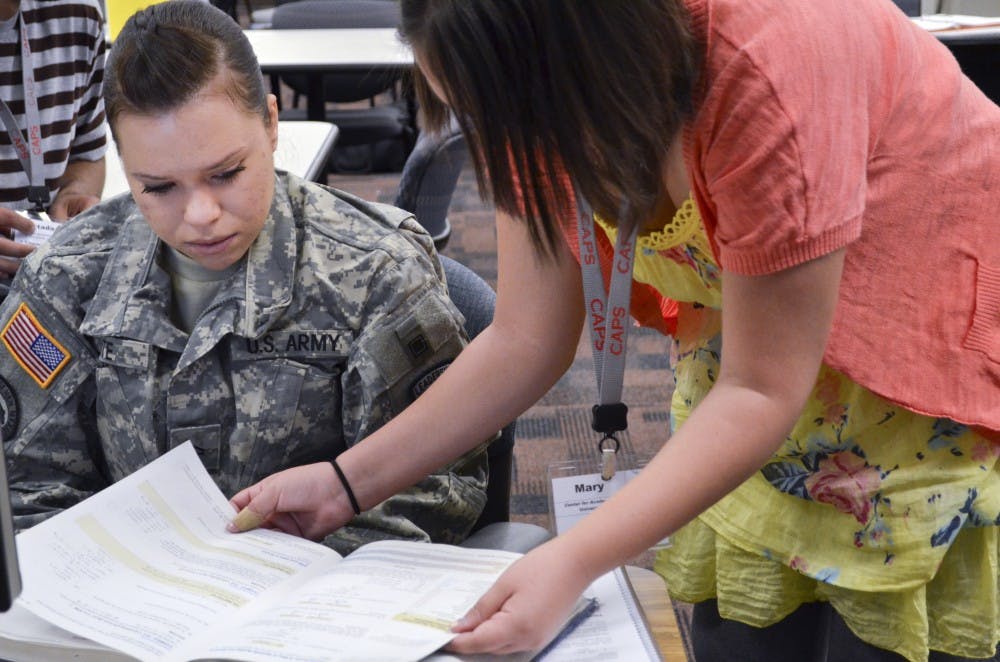news@dailylobo.com
Students who find that peer tutors at the Center for Academic Program Support (CAPS) are sometimes not able to provide adequate tutoring can receive additional assistance; all they have to do is ask.
UNM student Jacob Lowe said that although CAPS is helpful most of the time, he had some experiences with a tutor not being able to answer his questions, especially in science-related courses.
“Ninety-nine percent of the time you can get your questions answered,” he said. “Occasionally, there’s a tutor that can’t answer a question.”
But Lowe said that when a tutor can’t answer a student’s question, the issue is referred to another tutor. He said that ultimately, he gets his questions answered.
“They always refer you to someone who can answer your question, and there’s always someone here,” he said.
CAPS Senior Program Manager Daniel Sanford said the program has to deal with these kinds of issues “periodically” throughout the semester. He said the majority of students’ complaints are about the quality of science and math tutoring.
But Sanford said the problem exists in students’ unrealistic expectations of their tutors.
“(Peer tutors) are there to guide students through the inquiry process,” he said. “People should expect to get out of their tutoring sessions tools that will help them to do the questions by themselves more effectively. We’re trying to create independent learners.”
Sanford said peer tutors are hired for a semester based on their academic performance. He said students must have a grade point average of 3.0, and must have received mostly A’s and B’s for classes in the field in which they want to tutor.
Sanford said CAPS values applicants’ recommendations from professors and teacher assistants most importantly.
“We really depend on faculty referrals for tutors,” he said. “Being a peer tutor goes beyond knowing the contents of the field. We want people who model student behavior.”
According to the CAPS website, undergraduate peer tutors are paid $11 per hour and work 12 to 30 hours per week.
Get content from The Daily Lobo delivered to your inbox
Although graduate students can apply for paid positions, Sanford said only undergraduate students are hired as peer tutors. He said this perpetuates a friendly learning environment among other students.
“We’re a peer tutoring facility, so we’re not trying to hire Ph.D.s,” he said. “We’re not even trying to hire someone we’re setting up as an expert. We’re setting up someone as a learner who has recently been through or going through the process of the material, and who’s really good at talking about it.”
But UNM student Sienna Wright said undergraduate tutors at CAPS often explain concepts vaguely.
“While they may know what they’re talking about, they can’t really explain it,” she said. “And you really have to know what you’re teaching to be able to get that information across.”
Because many professors are graduate students, Wright said she expects help from them through the classroom. But she said instructors are not always available for answers.
“I would prefer to ask a professor,” she said. “But when you’re going to a tutor, that often means your professor is not available, so it can be hard.”
But Wright said she has not encountered many tutors who can’t answer her questions. She said that although CAPS should hire more graduate students for its tutoring programs, the hiring process benefits undergraduate tutors significantly.
“The benefits of hiring more undergraduate students are that it gives more jobs to them, because it’s harder finding a job than when you’re a graduate (student),” she said.
Sanford said CAPS has 130 peer tutors who lead study sessions in mathematics, writing, foreign languages and various sciences. He said CAPS also offers tutors for less popular courses, such as music theory.
Sanford said that after tutors are hired, they attend a presemester training course and are required to attend training meetings on Friday afternoons throughout the semester. He said that once CAPS receives complaints against a certain tutor, the tutor will undergo advisement and further training, but if issues persist, the tutor may be fired for the following semester.
Sanford said students who have problems with tutoring sessions should report their problems to CAPS so staff members can provide them with further assistance.
“There is always going to be a case in which peer tutors don’t know the answer, and we don’t expect them to,” he said. “No one person will have all the answers. It’s a collaborative endeavor.”
Sanford said CAPS doesn’t plan to hire graduate students for peer tutors, although he agrees that they have more mastery of the subjects.
“That approach will undermine what we’re doing,” he said. “It’s our very firm belief that someone who’s more recently … gone to the challenge of learning is in a much better position to empathize with the student.”






